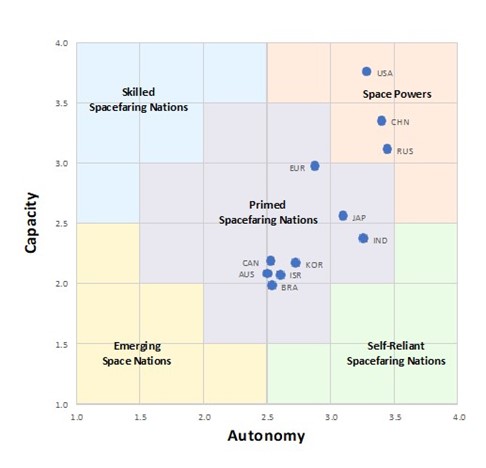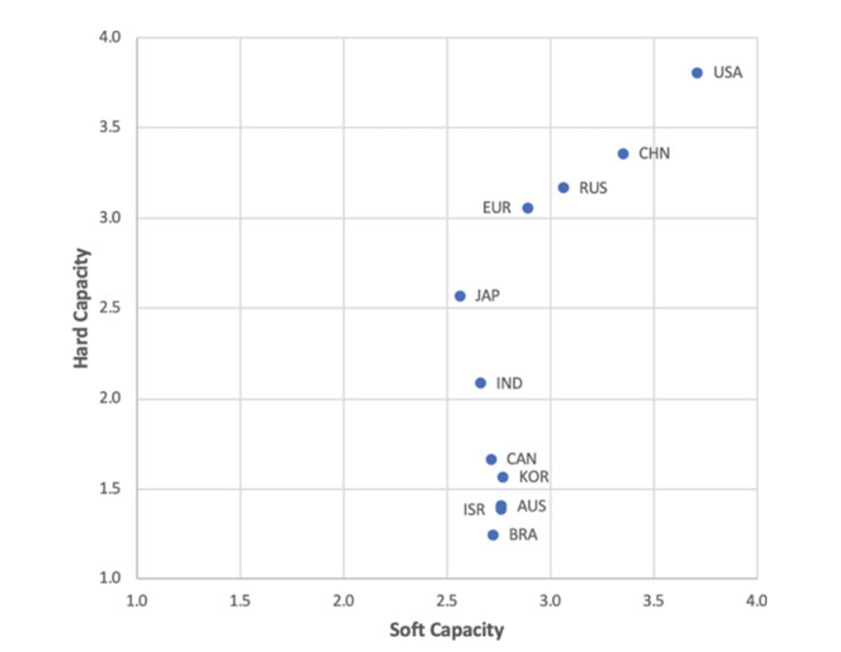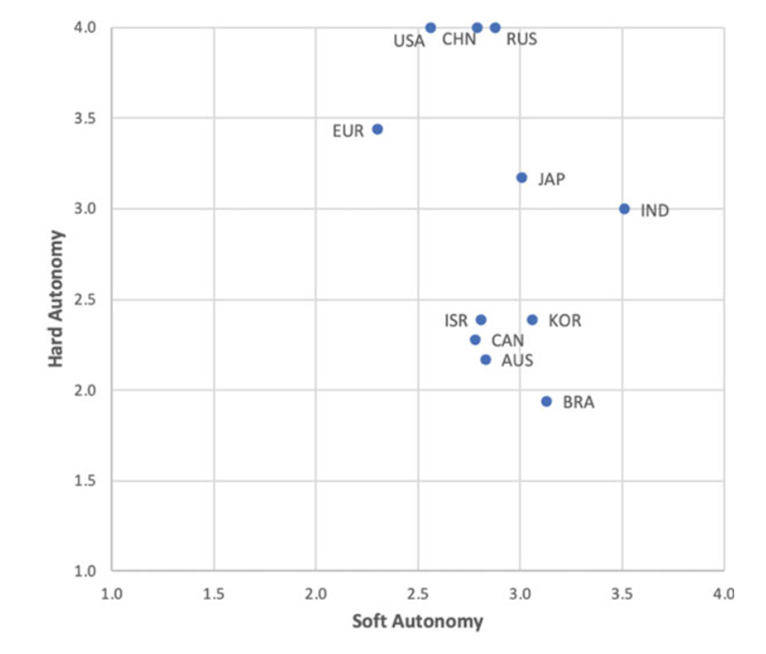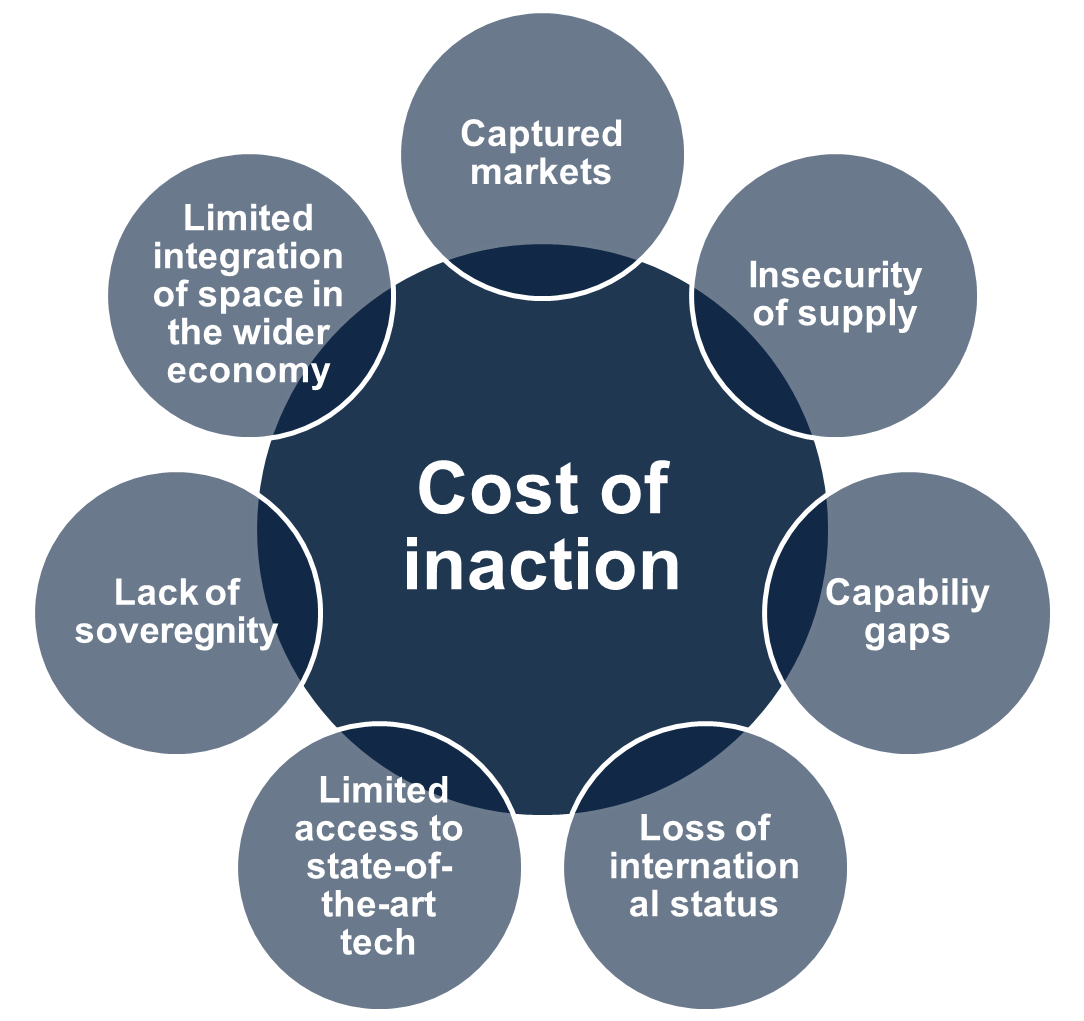This Brief builds on new ESPI book “Power, State and Space” which sets forth comprehensive, cross-disciplinary conceptual framework aimed at a dynamic comparison of space actors, taking into account their technical, industrial and political characteristics as well as the trajectories that bring them in or take them out of ‘the club’ of space powers. The deployed measurement model allows to quantify spacepower across two dimensions: capacity and autonomy.
Is Europe as a Space Power?
Politicians, space professionals and scholars alike frequently delve into discussions surrounding the notions of spacepower and space power. When commenting the release of the EU 2022 Strategic Compass for a stronger EU security and defence in the next decade, for instance, the High Representative of the European Union for Foreign Affairs and Security Policy Joseph Borrel asserted that Europe holds the status of a “significant space power” thanks to its substantial market share in the global space industry and European success stories like Galileo and Copernicus.
Space power status, however, should not be claimed on the basis of market share only or other simplified indicators such as the launch cadence or the number of active satellites a country may possess. A space power should be understood as an entity with the means to autonomously deploy, operate and benefit from any space-related capability to support the achievement of national objectives that is has autonomously determined,
Despite the certainly numerous achievements to look back on and its extant position in the international “space club”, Europe today does not fully meet these requirements. This inference finds a clear match with the results of the comparative assessment and compilation of the spacepower index performed in the book “Power, State and Space”.
As graphically captured by the matrix below, space power is a distinct status that can be exclusively bestowed upon states that possess a definitive quantum of spacepower, characterized by the confluence of a high degree of autonomy and a strong level of capacity.

Measuring Spacepower
The spacepower index and matrix is built through the aggregation of 94 indicators that take into account the interaction between the two equally crucial components of autonomy and capacity.
Measuring Capacity
Capacity can be broadly defined as the state’s ability to implement space-related strategies in order to achieve its economic, political, or societal goals. Capacity comprises both a hard and a soft dimension. To capture shifts in the overall capacity distribution, a set of two indices has been deployed:
- The hard capacity index, based on 37 indicators, aims to assess the material assets and abilities allowing an actor to operate in, through, and from space across the full spectrum of existing space capabilities. Hard capacity stretches across four prominent macro-areas: “applications satellites”, “science and exploration”, “space safety and security”, and “enabling and support”.
- The soft capacity index, based on 26 indicators, aims to evaluate the state’s ability to effectively utilise and integrate assets and expertise in national policies, infrastructure, and activity. It stretches across two major macro- areas: “foreign and security policies” and “socio-economic policies” which in turn encompass three and four areas respectively (security, defence, and foreign policy; environment and resources, infrastructures, development and growth, and civil society).
Eventually, scores for the two capacity indices have been averaged and combined into a single capacity index. This total capacity value is then used to plot the main matrix of space power for a given country or region.
Measuring Autonomy
Autonomy refers to the state’s ability to independently set directions, define policies, and operate in the space realm by relying on its own strengths and resources. Autonomy comprises two dimensions, a technical and a political one. Accordingly, autonomy has been measured through two indices.
- The technical (or hard) autonomy index, based on 13 indicators, aims to assess to which extent a state has the means to access and operate in space without relying on external sources of supply. Technical autonomy is articulated in three macro-areas: “production phase,” covering space hardware and infrastructure, “operations phase,” encompassing launch operations, satellite operations, and crewed operations, and “exploitation phase,” which refers to data acquisition and service provision.
- The political (or soft) autonomy index, based on 24 indicators, aims to evaluate the state’s ability to formulate interests of its own, independent of or against the will of divergent political and societal interests emanating from both inside and outside the country. It covers two major macro-areas, namely “autonomy in external decisions” and “autonomy in internal decisions.” Within these two macro-areas, the autonomy of space actors has been assessed vis-à-vis three prominent agents of influence: foreign nations, the domestic military, and domestic corporations (state or private).
As for capacity, eventually, the two autonomy indices have been averaged and aggregated in a total autonomy index. This total autonomy value is used to plot the main matrix of space power.
Where does Europe Stand?
When conflating the indicators into a single composite index and mapping the actors on the matrix, only three actors emerge as full-fledged space powers, in the order: the United States, China and Russia— with Europe following at considerable distance outside the “space powers” area. Countries like India and Japan, thanks to their recent achievements and forward-looking strategies, are catching up with Europe’s position quickly.
Europe’s capacity
Certainly, the European continent proves one of the most experienced actors in the international arena, boasting state-of-the-art capabilities across a wide spectrum of activities. Through its different constituents—the EU, ESA, EUMETSAT, their member states and private companies—it has mastered a wide array of capabilities and achieved many successes with breakthrough missions and programmes, such as the successful science missions led by ESA, the operational Copernicus and Galileo flagship programmes, and world-leading commercial solutions on a range of downstream applications.
 That said, Europe lags behind prominent space powers in several critical hard capacity macro-areas such as human space exploration, Space Situational Awareness, and space control.
That said, Europe lags behind prominent space powers in several critical hard capacity macro-areas such as human space exploration, Space Situational Awareness, and space control.
What is more, that gap is widening and Europe now even risks losing further ground vis-à-vis former peers, which are accelerating the use of space in their countries. The current European launcher crisis provides a poignant illustration of the inherent risk of losing hardcore capabilities.
On the soft capacity side, Europe can boast some positive results in the use of space within its socio-economic policy (agriculture, environment energy, mobility, etc.), as demonstrated by the adoption rate of space-based applications and the amount of dependent Gross Value Added on these applications.
However, Europe falls short on other key indicators, such as the use of space for military and security applications or the use of space for diplomatic purpures, negatively impacting Europe’s overall capability to develop the full benefits of space and its spacepower performance.
Similarly, Europe does not, as yet possess hard (technical) autonomy across the entire spectrum of space activities, most notably in human access to space and crewed operations.
Europe’s autonomy
It is important to highlight, however, that the most worrisome aspect is not Europe’s reliance on final products or systems, but rather on the foundations associated with basic technologies, since the lower the level of technology on which a country or region is dependent, the greater the weakness of the country or region.
 While Europe possesses the broad majority of processes and industrial capabilities needed to develop space programmes, European stakeholders still need to externally source many components, and raw and advanced materials as well as some basic and digital technologies and building blocks that are not available within European boundaries. This most notably includes EEE components, software, advanced materials, equipment, processes, and modelling tools.
While Europe possesses the broad majority of processes and industrial capabilities needed to develop space programmes, European stakeholders still need to externally source many components, and raw and advanced materials as well as some basic and digital technologies and building blocks that are not available within European boundaries. This most notably includes EEE components, software, advanced materials, equipment, processes, and modelling tools.
Overall, Europe’s medium score in the technical autonomy dimension (3.4) is further hindered by a meagre 2.3 on the political autonomy dimension, resulting in a total autonomy value lower than India and Japan.
From a political perspective, Europe remains very vulnerable to the inducements and impositions of foreign actors when it comes to both its external and internal decisions. An analysis of the broader European space relations with foreign actors clearly shows how sensitive Europeans are about preferences of its closest ally, the United Sates. This “sensitivity” ultimately points to the fundamental structural weakness in Europe’s space policy and diplomacy, namely the current pan-European struggle to advance its own space agenda when it may directly affects US interests and security aspects.
The limitations and dependencies embedded in the current political setting prove to be a specific feature of the European actorness. In addition, due to the complex tangle of relationships, institutions, and multi-level sharing of competences, Europe as a whole lacks the fundamental features defining autonomy over space matters. Specifically, the interplay between national, intergovernmental and communitarian frameworks still is a source of institutional misalignment, often harming Europe’s ability to develop a clear and coherent strategy for the future and to act decisively.
Overall, if Europe today holds some degree of spacepower, it cannot claim the status of space power. It is a primed spacefaring “region”, i.e., an actor that has attained “respectable” levels of both capacity and autonomy that could, in principle, be on its way to becoming a space power.
Becoming a Space Power: The Stakes
If Europe is not a space power, it can nonetheless become one. Crucially, it must become one, for what is at stake is much more than its relative position in the global space arena.
What is first and foremost at stake is Europe’s political sovereignty over space matters, its ability to develop the full benefit of space and its declared objective to assert itself as a global player and partner.
 Indeed, Europe’s lack of autonomous capacities may impact its freedom of action and ultimately restrict its ability to decide when and under what conditions to develop and deploy its space programme. In addition, by maintaining the status quo Europe may not enjoy the autonomy to freely choose its partners, remaining at the mercy of external forces and accepting a higher level of vulnerability. From a political perspective, no actor with a minimum of strategic ambition in space can stand the consequences of a high level of dependence.
Indeed, Europe’s lack of autonomous capacities may impact its freedom of action and ultimately restrict its ability to decide when and under what conditions to develop and deploy its space programme. In addition, by maintaining the status quo Europe may not enjoy the autonomy to freely choose its partners, remaining at the mercy of external forces and accepting a higher level of vulnerability. From a political perspective, no actor with a minimum of strategic ambition in space can stand the consequences of a high level of dependence.
Conversely, becoming a space power would translate into greater industry and programmatic security, ensuring mission independence in case of necessity (e.g., in case of an impending natural disaster, a trade dispute, or a war).
What is, however, more crucially at stake is the possibility for Europe to seize the invaluable benefits the unfolding “Revolution Space” will accrue in a number of strategic domains, including prosperity and wealth, peace, security and cooperation, climate action and sustainability, society, inspiration and empowerment for future generations. The benefits of space reach across all domains of the economy and society, including agriculture, energy, mobility, health, urban development, education, and entertainment, among many others.
To rebound the admonition of the High-Level Advisory Group on Human and Robotic Space Exploration for Europe:
“Space is currently undergoing a revolutionary change, comparable to the internet economy 20 years ago, the consequences of which affect all domains of life. Europe cannot afford to miss a new potential golden age with high multiplier effects across the economy… The cost of inaction would far outweigh the necessary investment to establish Europe as a strong and independent space actor.”
Report of the High-Level Advisory Group on Human
and Robotic Space Exploration for Europe
In an increasingly polarised world centred around continental powerhouses, lack of prompt action would entail far-reaching consequences that go well beyond (the opportunity cost in) the space sector, condemning the continent to be just a witness of decisions – and changes – set elsewhere…
Becoming a Space Power: The Means
For Europe, reaching and maintaining the status of space power essentially necessitates meeting two broad conditions:
- Advancing its capacity edge through the sustained development of its hard capacities (i.e., the upgrading of existing assets as well as the development and maturation of new capacities), and the integration of those capacities into European and national infrastructures, policies and strategies.
- Establishing an appropriate level of autonomy enabling Europe as a whole to develop and use its space programme without the necessity of seeking any kind of permission from anyone.
Developing and maintaining autonomous capacities across the entire spectrum of activities is the task of the decade. The amount of investment needed to assert itself as a full-fledged space power is within reach in the context of Europe’s economic strength, especially given that the average GDP share of space investment in Europe is about 1/5th of that of the US.
A more politically oriented profile is needed if Europe is to attain such status, requiring to revisit the overarching policy drivers of the European approach to space.
Clearly, the decision to develop capacities – partially or along the full spectrum of capabilities, with a narrow or a wide scope – as well as the decision to do so with a high degree of autonomy or by relying on third countries’ capabilities, is the result of a political decision; a process that largely resembles the process that drives a country’s decision to become a military power, or not.
This means that any European decision in the direction of attaining space power status and seize the full value of space should be politically driven.. This should include the provision of political direction to economic actors, going beyond economics as the sole driver for Europe’s ambitions in space.
Ultimately, making Europe a full-fledged space power is a matter of political will at the highest level.
Thanks to its legacy, expertise, knowhow and competitive industrial capacity, Europe can become a space power [….] But real political will and a bold vison at the highest political level is required. Every great achievement—be it in space or elsewhere—requires such a vision and political commitment [….] It now behoves European statespeople at the highest political level to come together and jointly forge a grand European vision that can take space and Europe to the next level.
Josef Aschbacher, ESA Director General
Given these many challenges that must be overcome, it is clear that Europe’s path towards space power status will be a complex process ultimately demanding a deeper advancement of the political dimension of the European project. Recovering unity of vision and action will be the key tool to fully attain Europe’s space power potential.




